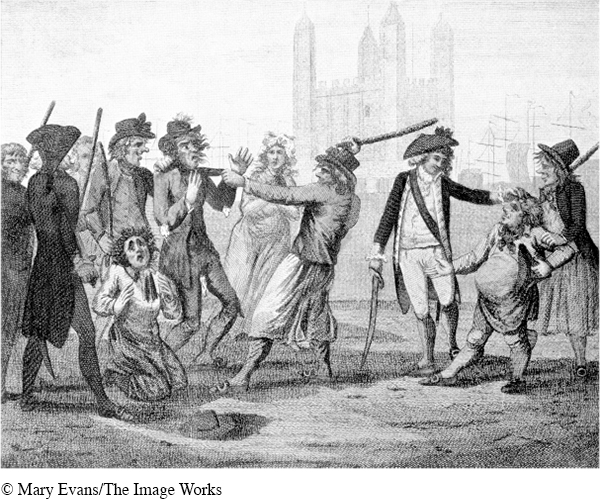Common Grievances
Like the Proclamation Line, which denied all colonists the right to settle beyond the Appalachian Mountains, the policy of impressment affected port city residents of all classes. Impressment had been employed by the British during the extended wars of the eighteenth century to procure seamen. While plucking poor men from ports throughout the British empire, the Royal Navy faced growing resistance to this practice in the American colonies from merchants and common folk alike.
Seamen and dockworkers had good reason to fight off impressment agents. Men in the Royal Navy faced low wages, bad food, harsh punishment, rampant disease, and high mortality. As the practice escalated with each new war, the efforts of British naval officers and impressment agents to capture new “recruits” met violent resistance, especially in the North American colonies where several hundred men might be impressed at one time. In such circumstances, whole communities joined in the battle.

In the aftermath of the French and Indian War, serious impressment riots erupted in Boston, New York City, and Newport, Rhode Island. Increasingly, poor colonial seamen and dockworkers made common cause with owners of merchant ships and mercantile houses in protesting British policy. Colonial officials—mayors, governors, and custom agents—were caught in the middle. Some insisted on upholding the Royal Navy’s right of impressment; others tried to placate both naval officers and local residents; and still others resisted what they saw as an oppressive imposition on the rights of colonists. Both those who resisted British authority and those who sought a compromise had to gain the support of the lower and middling classes to succeed.
Employers and politicians who opposed impressment gained an important advantage if they could direct the anger of colonists away from themselves and toward British policies. The decision of British officials to continue quartering troops in the colonies gave local leaders another opportunity to join forces with ordinary colonists. Colonial towns and cities were required to quarter (that is, house and support) British troops even after the Peace of Paris was signed. While the troops were intended to protect the colonies, they also provided reinforcements for impressment agents and surveillance over other illegal activities like smuggling and domestic manufacturing. Thus a range of issues and policies began to bind colonists together through common grievances against the British Parliament.
Exploring American HistoriesPrinted Page 149
Exploring American Histories Value EditionPrinted Page 113
Chapter Timeline